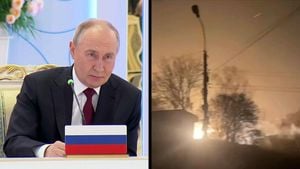Imran Khan, the former Prime Minister of Pakistan and the founding chairman of the Pakistan Tehreek-e-Insaf (PTI) party, continues to face significant legal and political challenges as he remains imprisoned under serious allegations. These issues stem from his ousting from power and have resulted in multiple arrests, courtroom battles, and internal party strife.
Recently, the PTI political committee held a pivotal meeting, emphasizing the dire circumstances surrounding Khan's health and safety. They publicly urged authorities to restore access for his family, legal representatives, and party officials, aiming to guarantee transparency on his well-being. The request resonates with growing concerns from the public and party members alike. The committee warned the Prime Minister and the Punjab Chief Minister, as well as jail authorities, they would be held accountable for any lapse affecting Khan's safety.
Authorities from Adiala Jail, where Khan is currently detained, have asserted his health status to be stable. Reports confirm he is complying with required medical checkups, which indicate normal blood pressure and sugar levels. Jail officials also state he maintains his fitness regimen by exercising twice daily. Nonetheless, the PTI’s statements reflect deep concern among its ranks about the care Khan receives during his time behind bars.
Adding to the former Prime Minister's woes, he recently faced new charges, with six additional cases filed against him—a situation prosecutors have indicated will lead to another period of physical remand. Khan's current detention stems from protests on September 28, and accusations against him have included orchestrated violence. The significance of these events cannot be overstated, as they symbolize the turmoil within Pakistan's political framework.
Faisal Vawda, a senator from the PTI, has raised alarm bells, claiming organized propaganda is being perpetrated against Khan through his social media accounts. Vawda stated, "The same propaganda campaign has been working against Khan, labeling him insane and undoing his public image." He believes damaging tweets have been posted by conspirators, possibly with motives detrimental to Khan's political future. He advised supporters to be skeptical of the content coming from Khan's Twitter, urging them to focus on the broader political picture instead.
Internally, the PTI appears to be grappling with significant dissent. A spokesperson for Bushra Bibi, Khan's wife, revealed Khan’s private frustrations about the party's leadership. He reportedly feels betrayed, suspecting some party members are undermining his leadership from within. This claim highlights the rift between Khan and his trusted aides. According to the spokesperson, Bushra is serving as Khan's direct messenger to the party base, indicating Khan’s need to reestablish communication as he contemplates his party's future from prison.
Compounding these challenges, there have been allegations within the party about sabotage by Khan’s own supporters. The political climate is so severe it has led to suggestions of potential violence against Khan from individuals within PTI—an unthinkable betrayal of loyalty for any politician. Vawda went on record to state his concerns for Khan's safety, reiteratively underlining the perceived threats, both inside and outside the party.
On the streets, the PTI's recent protest efforts demanding Khan’s release have been met with aggressive police action, resulting in low morale among supporters. The party's attempts at organizing mass protests have fallen flat recently. A notable protest attempt led by Bushra Bibi was seen as poorly planned, leading to retreat rather than the promised mobilization for Khan’s release.
The heightened scrutiny and failing protest attempts have placed increasing pressure on the party, signaling widespread dissatisfaction among its supporters. Many PTI members feel abandoned as they stood up against the government’s excessive force during recent protests. This dissonance between the party leadership and its grassroots supporters could spell trouble for the achievements the PTI has claimed, particularly as Khan's continued absence from leadership leaves unanswered questions about the party's direction.
Despite facing adversity, loyalty among Khan’s supporter base remains strong. Many attendees of the protests have expressed unwavering dedication to his cause and have indicated they are willing to endure hardships to push back against the state’s actions. The challenges posed by infighting and mismanagement have, regrettably, overshadowed the party's narrative of potential and change.
The political stage is poised precariously as these events evolve. Khan's active detainment without clear pathways to resolution establishes growing tensions between the PTI and the coalition government. Many political analysts are left pondering whether Khan’s fate will serve as the catalyst for long-awaited change or simply reinforce the reality of political stagnation as seen throughout Pakistan's tumultuous history.
With no clear answer to the political conundrum at hand, the fate of both Khan and the PTI remain uncertain. The repercussions of internal dissent and overarching government pressure may well determine the long-term viability of Khan’s vision for Pakistan—a vision now obscured by legal battles and internal party discord.
Both Bushra Bibi and other PTI leaders have consistently called for mobilizing supporters within the framework of solidarity, but without Imran Khan at the helm, the party's future hangs precariously. It remains to be seen whether this disarray will curtail PTI's influence or if they can reclaim momentum as they navigate their founder's turbulent legal situation.



